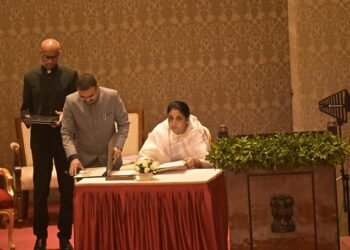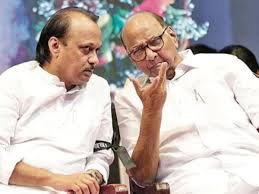Congress accuses Assam Government of crony capitalism, gifting protected tribal land to corporates while betraying Assam’s indigenous.
BY Navin Upadhyay
August. 19, 2025 —A string of land controversies under Chief Minister Himanta Biswa Sarma’s government has sparked outrage among Assam’s indigenous communities, who accuse the regime of systematically dismantling long-standing protections to benefit corporate houses at the cost of tribal survival. The most recent flashpoint came when the Gauhati High Court sternly rebuked the state for allocating nearly 3,000 bighas of land in Dima Hasao’s Umrangso region to a private cement company. The bench questioned whether such a massive transfer in a Sixth Schedule area—designed precisely to safeguard tribal autonomy—could ever align with the public interest.
If the High Court rebuke underscored legal scrutiny, it was Kokrajhar that brought tribal resistance to its fiercest point. The Bodoland Territorial Council, with state approval, had quietly sanctioned the allotment of 3,600 bighas of forest and tribal land in Bashbari–Paglijhora to the Adani Group for a thermal power project under the Assam Power Distribution Company Ltd. Officials may have seen it as a routine industrial investment, part of a ₹40,000-crore, 3,000 MW power plan promising one lakh jobs, but they gravely underestimated the resolve of the people whose land was at stake.
READ: Opinion: Will Gyanesh Kumar Take the Same Oath He Demands of Rahul Gandhi?
That land fell within a Sixth Schedule area, and, crucially, forest rights under the Forest Rights Act, 2006, had only recently been recognized there. Yet the administrative move to reclassify the land and push through the allotment barreled ahead—without environmental clearance, without tribal consent, without community consultation. For the All Assam Tribal Students’ Union (AATSU), it was a flagrant violation of every safeguard on paper. Villagers responded with fury. Bodo, Rabha, and Garo families gathered in mass rallies from June, shouting “Adani go back.” Survey teams fled under pressure. A second squad, escorted by police, was forced back again—this time facing threats of self-immolation from desperate villagers.
Guwahati High Court Judge Sanjay Kumar Medhi expressed disbelief over the Assam BJP government’s allocation of 3,000 bighas (81 million sq ft) of tribal land in Dima Hasao to the Adani Group for a cement factory, reportedly asking, “Is this a joke? Are you giving an entire… pic.twitter.com/d4ipF0PYzg
— Lavanya Ballal Jain official (@LavanyaBallal) August 18, 2025
Organizations like AATSU, the Bhumi Odhikar Joutho Sangram Manch, and the Bashbari Land Protection Committee meticulously documented these violations and challenged the BTC’s authority to permit such transfers in the first place. With resistance hardening and litigation looming, Sarma sought to defuse the crisis by floating relocation offers, suggesting Goalpara or Dhubri as alternative sites. But assurances that no one would be forcibly displaced failed to convince. Protesters saw the proposal not as development but as dispossession.
Ultimately, the weight of public anger, the risk of constitutional challenge, and the prospect of alienating a crucial tribal vote bank ahead of elections forced the government to retreat. The Kokrajhar project was canceled, a rare case of the state bowing to the streets. “This is not just about land—it is about our identity and our livelihood,” one protest leader warned, capturing the sentiment that carried the day.
Yet Kokrajhar was only one battle. Simultaneously, the BTC floated plans to set aside another 2,400 bighas in the same area for a Railway Coach Factory—again triggering resistance from AATSU, which warned that such moves systematically undermine tribal autonomy.
The backlash has not gone unnoticed in the political arena. The Congress accused the government of practicing naked crony capitalism, gifting land to corporate allies while betraying the indigenous communities whose rights are enshrined in the Constitution. The Assam Jatiya Parishad (AJP) went further, warning that proposed amendments to Assam’s land laws would loosen restrictions in tribal belts and blocks, paving the way for outsiders to buy what was once inalienable. AJP demanded transparency and broader consultation, warning that such reforms, if unchecked, would institutionalize dispossession.
Beyond party lines, a wider ecosystem of tribal and rights groups has joined in. The Bhumi Odhikar Joutho Sangram Samity, Adivasi Sangharsh Morcha, and numerous local councils have turned Guwahati into a rallying ground, framing the issue not as isolated skirmishes but as part of a larger national crisis of tribal land loss.
With Bodoland Territorial Council elections looming in 2026, this growing unrest has become an existential political risk for Himanta Biswa Sarma. The tribal vote is central to electoral fortunes across Assam’s hills and valleys, and a narrative of government-facilitated land grabs could prove costly. The High Court rebuke, the Kokrajhar retreat, and the simmering protests in Dima Hasao and Guwahati are more than scattered controversies—they represent a deepening trust deficit between the state and its indigenous people.
For now, the government has pulled back from the brink. But the broader battle lines are clear: in Assam, land is not merely territory—it is identity, autonomy, and survival. And as recent months have shown, those who threaten it do so at their own political peril.
The All Assam Tribal Students’ Union (AATSU) has flagged a string of attempted land transfers affecting tribal belts:
- 3,600 bighas to Adani Group for Kokrajhar power project
- 2,400 bighas for a railway coach factory in the same region
- 1,000 bighas for a BSF camp at Bashbari
- 9,000 bighas to Adani for a power initiative in Umrangso
- 1,500 acres earmarked for a satellite township in Barduar, Kamrup
AATSU argues these moves trample constitutional protections under the Sixth Schedule and Assam Land and Revenue Regulation, 1886, threatening the heritage of Bodo, Rabha, Garo, Dimasa, and Karbi communities.













